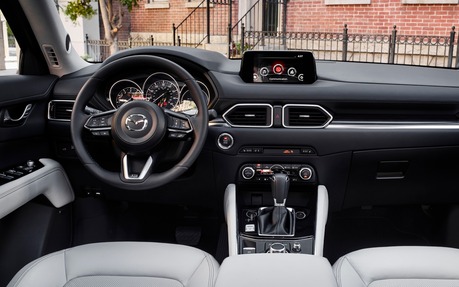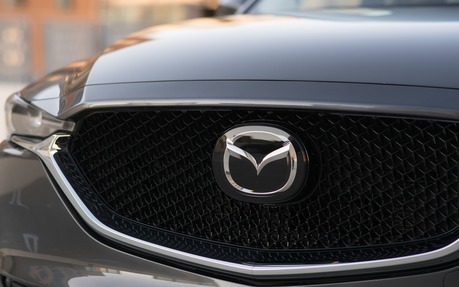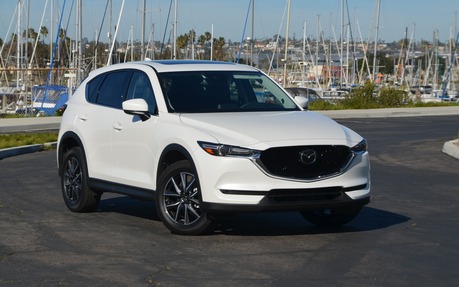2017 Mazda CX-5: Improving – Not Reinventing – the Wheel
The Mazda CX-5 was introduced in 2012, and it quickly earned a great reputation for dynamic handling that feels more like a car than an SUV. Since a few years have passed since then, Mazda decided to give this vehicle a refresh.
First, the designers updated the front section, giving it narrower headlights that bear a striking resemblance to those on the CX-9. In fact, this big brother inspired a number of elements on the CX-5. Though it’s hard to tell at first, a whole host of details were tweaked. During the press conference before the test drives, one of Mazda’s designers spent at least five minutes talking about the new profile of the door handles. But we were more interested in the fact that rear doors now open wider, which makes it easier to slide onto the rear bench.
- Also: 2017 Mazda CX-5: new and improved, with a diesel engine too
- Also: Exclusive: We Test the Mazda CX-5 Diesel, the CX-5 of the Future!

Major mid-generation changes
They made some pretty big changes inside the cabin. A tablet-like central screen sits on top of the dashboard, which is a configuration more and more automakers are opting for. The steering wheel was redesigned, as was the centre console, which is now higher than before. Several other modifications were made here and there. Most will go unnoticed, but together they improve the overall design and functionality.
Mazda invested a lot of time into improving the CX-5’s soundproofing. An additional rubber seal was added in the doors, the windows are thicker and the trunk sides have gone from bare plastic to carpeted (using the same material found on the floor). While I never actually measured the number of decibels produced by the old CX-5 at 100 km/h, my ears say that the new CX-5 is quieter, especially at cruising speed. Accelerations are still a little noisy, though not excessively so.
Other than a few modifications made to the chassis to reduce noise in the passenger compartment, nothing has changed. And that’s just as well because the old CX-5 was great in this regard. However, Mazda did add G-Vectoring. We’ll get to that later.

The engines: Insufficient, decent and conspicuously absent
One great thing that Mazda should have updated was the lacklustre drivetrain. The Japanese brand kept the 155-horsepower, 150-lb.-ft., 2.0-litre weakling for the base trim. Its sole purpose is to draw customers into showrooms with an attractive price. As before, this mill can be paired with a six-speed manual (FWD) or automatic (FWD or AWD). This engine wasn’t up to task before, and it definitely won’t be any better now!
The other engine, a 2.5-litre, is better. But it’s still not good enough. It produces 187 horsepower (compared to 184) and 185 lb.-ft. of torque for linear accelerations and reasonable pick-up. The six-speed automatic transmission changes gears quickly, smoothly and at the right time. But Mazda should have reprogrammed the Sport mode, which doesn’t serve much purpose unless you want to drive aggressively. It keeps the engine revs so high that it becomes annoying, not to mention pointless most of the time. We tested this combination paired with AWD. By the end of the test drive, we had recorded an average fuel consumption rate of 25.1 MPG (9.4 L/100 km). This was pretty good considering our driving style and the winding mountain roads we covered.
Mazda made a big deal about the diesel engine that was supposed to equip the Mazda6. In the end, it never came to North America. Now they’re promising a diesel for the CX-5, which our colleague Marc-André Gauthier tested in Japan. But it won’t arrive until next fall or winter (the engine, not Marc-André; he’s been back for a while).
G-Vectoring Control
After installing G-Vectoring Control on the Mazda3, Mazda6 and soon in the CX-9, Mazda has now included it in the CX-5. This system controls the vehicle’s stability, but the most noticeable benefit is better controlled weight transfers. As a result, you get a smoother ride. At low speeds, the G-VC can seem useless, but you’ll appreciate it at cruising speed. This system comes factory standard, even in the baseline CX-5 GX.
The improvements made to CX-5 don’t change the vehicle dramatically, and it would be an exaggeration to call it a second generation, as Mazda is doing. But the vehicle is definitely more refined than before, despite the fact that it was already one of the best-equipped machines in its category. It has kept some of the core qualities that make it fun to drive—and it has also kept some of its flaws, such as very few storage spaces, modest power and a horrible navigation system.
Besides that, the CX-5 is one of the best deals in the compact SUV segment!
***
The 2017 CX-5 will be available in showrooms within a few weeks.
Here’s the partial price list:
CX-5 GX, front wheel drive, six-speed manual, 2.0-litre engine: $24,900
CX-5 GX, front wheel drive, six-speed automatic, 2.5-litre engine: $26,300
CX-5 GX, all wheel drive, six-speed automatic, 2.5-litre engine: $28,300
CX-5 GS, front wheel drive, six-speed automatic, 2.5-litre engine: $29,100
CX-5 GS, all wheel drive, six-speed automatic, 2.5-litre engine: $31,100
CX-5 GT, all wheel drive, six-speed automatic, 2.5-litre engine: $34,700
| Test drive report | |
| Test model | 2017 Mazda CX-5 |
|---|---|
| Trim level | GT AWD |
| Price range | $24,900 – $34,700 |
| Price as tested | CA$34,700 |
| Warranty (basic) | 3 years/unlimited |
| Warranty (powertrain) | 5 years/unlimited |
| Fuel economy (city/highway/observed) | N/A / N/A / 9.4 L/100km |
| Options | N/A |
| Competitive models | Chevrolet Equinox, Ford Escape, GMC Terrain, Honda CR-V, Hyundai Tucson, Jeep Cherokee, Kia Sportage, Mitsubishi Outlander, Nissan Rogue, Subaru Outback, Toyota RAV4, Volkswagen Tiguan |
| Strong points |
|
| Weak points |
|
| Editor's rating | |
| Fuel economy | Not too good, not too bad |
| Comfort | Some may find the suspension too stiff. The cabin is a quieter than before. |
| Performance | 3.5 stars for the 2.5-litre engine. Barely 2 stars for the 2.0-litre |
| Infotainment | This is the area that Mazda needs to improve on. For example, my colleague and I spent 10 minutes trying to modify the GPS’s scale. |
| Driving | Impressive for an SUV. |
| Overall | The CX-5 is one of the best deals currently on the market. |
